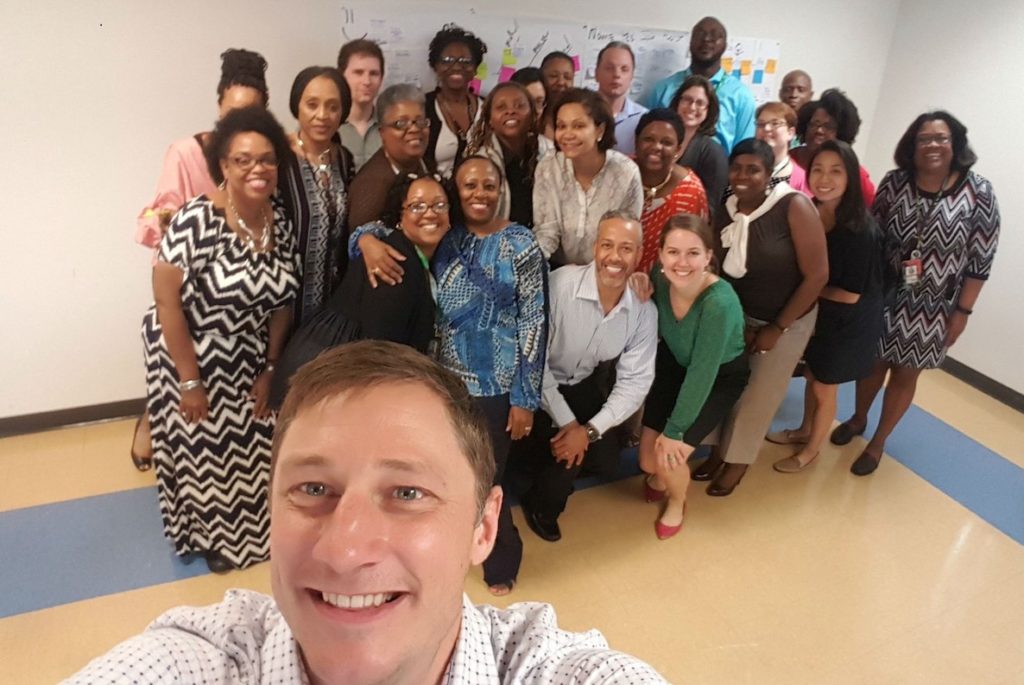When Denver Mayor Michael Hancock said he wanted to train city employees how to spot and fix inefficiencies in their work, Brian Elms is the person he asked to do it. The training operation Elms built, called Peak Academy, quickly became a fixture in Denver City Hall — it’s trained about 8,000 employees in seven years, and saved the city close to $37 million by squeezing waste out of workflows and day-to-day transactions.
![]() Peak Academy has become a model for other cities, and Elms’ book, Peak Performance, has become required reading in city halls across the country. Some cities have sent staff to Denver to take its five-day course and bring back lessons, while others have asked Elms, now a consultant, to help them plant a version of Peak Academy in their cities.
Peak Academy has become a model for other cities, and Elms’ book, Peak Performance, has become required reading in city halls across the country. Some cities have sent staff to Denver to take its five-day course and bring back lessons, while others have asked Elms, now a consultant, to help them plant a version of Peak Academy in their cities.
Bloomberg Cities spoke with Elms last year about how Peak Academy works in Denver and what other cities are learning as they replicate the model.
Bloomberg Cities: What is Peak Academy?
Brian Elms: Originally, Peak was designed to be a Lean program — Lean is a process-improvement technique inspired by Toyota manufacturing. And the purpose of Lean is to identify where there’s waste in a process and eliminate the waste.
Denver Health was running a pretty successful process-improvement program that really helped them during the recession. And when Mayor Hancock took over in 2011, he wanted to launch something similar.
BC: What types of government services lend themselves to the Lean approach?
BE: Every service. We looked for places where there’s duplicative checks, long waits to get something, large backlogs. Or where there’s a lack of standardization, which could be that it takes longer for you to get a service when you walk in than when I walk in. Those time delays cause people to get frustrated, it causes people to believe the government isn’t working, and internally, it causes people to get mad at each other and to treat each other poorly.
We started focusing on what our employees had control over, and what they could fix internally. The program is designed to teach employees very simple structured problem solving techniques. And very simple and practical understandings of how data is related to their jobs.
One thing we really focused employees on is to stop worrying about getting more staff, getting more technology, and getting more money into your organization. Instead of asking for those three things like that’s what’s going to solve the problem, why don’t you actually just solve the problem?
BC: Is the training aimed more at frontline workers or managers?
BE: It’s both, and all. When the frontline employee goes through a Peak Academy program, they’re learning skills they can translate into their daily work life, like how to improve a form on the city’s website. They figure out how to eliminate unnecessary verbiage within the form. They also figure out techniques on how to provide information so that the customer doesn’t get frustrated.
The mid-level manager learns it at a larger scale. How do I improve not just delivery of, say, a license plate at the DMV, but of the overall team. You do not have control over the employees providing the service, so you have to figure out ways to encourage them to come up with ideas and to experiment. And that’s really what your job is as a mid-level manager, is to help them figure out how they can improve the process, and your job is to remove the barriers.
BC: What’s an example of how this worked in Denver?
BE: We helped the Department of Excise and Licenses—they issue liquor and other licenses—we helped them eliminate a lot of their backlog. It used to take an hour and 45 minutes to process a typical transaction. They changed that to 12 minutes. And when they saw a huge increase in transactions, they maintained their wait time at 12 minutes, which is phenomenal.
![]() One thing we really focused employees on is to stop worrying about getting more staff, getting more technology, and getting more money into your organization. Everyone wants more of those things. But you’re in a government. The chance of you getting them is impossible. So instead of asking for those three things like that’s what’s going to solve the problem, why don’t you actually just solve the problem?
One thing we really focused employees on is to stop worrying about getting more staff, getting more technology, and getting more money into your organization. Everyone wants more of those things. But you’re in a government. The chance of you getting them is impossible. So instead of asking for those three things like that’s what’s going to solve the problem, why don’t you actually just solve the problem?
BC: What’s the Academy’s structure like?
BE: It’s got about $1.3 million in budget, and nine or 10 employees. There’s a bunch of facilitators, a director and a couple of interns. They basically have one or two people who are running classes all the time. And that’s one trick of the trade, the cadence behind it. In Denver, we ran a five-day session every month at least, and in some months we ran two. Once you offer that cadence, people start to take it more seriously and then they get more involved.
Other facilitators are assigned to a department for up to a year to attack a single key performance indicator. So when we were at the Human Resources department, we were looking at reducing the amount of time it takes to get a new hire on board. In the animal shelter, we were looking at reducing the length of stay of an animal, to adopt it faster. Or to make sure we were purchasing one type of fleet vehicle instead of 30 types of fleet vehicles—that project alone saved the city over $9 million.
The goal is to saturate the entire workforce with structured problem solving, and to create a language for how to attack a problem in your organization. Once your entire team is using the same vernacular, you can actually cut through to real solutions a lot faster, because you know what the problem is instead of everyone having their own philosophy about what the problem is.
And it’s super fun. When you walk into an Academy, every single lesson has a game. You’ll be having so much fun you don’t even know you’re learning.

BC: What are the games like?
BE: When we talk about organizing your workspace, what we dump two puzzles on the table that are in total disarray and then say, “You have 30 seconds to put this together. Go!” And they can’t. So then we’re like, OK, first you have to separate out the two puzzles and get rid of the clutter you don’t need. Then focus on only one part of the puzzle by putting together, say, all the straight edges. Then start filling in the center by looking at the picture. So you’re showing them how to standardize things, how to organize things, how to sort it and how to clean it through a puzzle, instead of me standing in front of a room saying “this is how you organize stuff.” It’s a super fun game. Everyone loves it. And yes, I travel with puzzles.
The people who do the work are the only ones who are going to be able to fix it. But they have to be in a position of power where they believe they can fix it. If they don’t believe they can fix it, it will never get fixed.
BC: This must require a lot of political support from the mayor.
BE: Mayor Hancock was hugely supportive, and he actually went through the five-day class to demonstrate how supportive he was. So we could say if the mayor has five days to do this, so do you.
It was hilarious. Everyone was so nervous that they were about to play these games with the mayor. And he’s there throwing paper airplanes against the wall as part of a game, and a woman on his team was giving him advice on how to throw the airplane properly.
BC: Where is the Peak Academy idea spreading to?
BE: I’ve worked with probably 10 or 12 cities in the last five years. There are full-scale Peak Academies in some cities and then there are others doing a partial Academy. I’d say Chattanooga, Tenn., Miami, and Gilbert, Ariz., probably run the most comprehensive replications of Peak Academy, where they’re doing classes every month and trying to build resources around it.
And then you have cities who are trying to train their innovation teams, or working on a single process area that’s struggling. Like Long Beach, Calif., who wanted to train a group of their human resources teams and their permitting teams.
Or places like San Francisco, who sent people to take Peak Academy classes when I still worked for the city of Denver. And they now run their own program entirely out of the controller’s office. They offer different types of trainings to all city employees. And they have an interesting setup where the controller goes to help another organization but charges for their time.
BC: What explains the growing interest in training city employees?
BE: Part of it is understanding that the more people you get involved in trying to solve city problems, the better results you have. If you train a thousand employees, you’re going to have an impact on every business line. It’s the democratization of innovation.
![]() I think it’s taking off because of how simple it is, how practical it is for team members to learn, how much fun it is, and because every tool works. If you implement half of what you learn in those few days, you’ll see and feel an impact at your job. It totally works.
I think it’s taking off because of how simple it is, how practical it is for team members to learn, how much fun it is, and because every tool works. If you implement half of what you learn in those few days, you’ll see and feel an impact at your job. It totally works.
BC: What challenges do cities face in trying to implement something like this?
BE: Everybody believes they’re a snowflake — they’re different than everyone else, so it can’t work in whatever organization they’re in. And there are some differences between, say, the public works department from one city to the next, but they’re not that unique.
The second thing is resources, and understanding that this is not something you can do by dipping your toe in the water. You can dip your toe in the water and have some success. But if you jump in, you’ll have tremendous success. And I think most people want to just dip their toe in the water.
Third is grit. When stuff gets hard, most of us stop, instead of continuing. It can be rough doing the same class over and over and over again.
BC: And what successes are you seeing in other cities?
BE: In Miami, they’re really starting to see cool things happening. One guy was trying to create a contract database, and he was pricing it out. And then he took the class and realized that rather than focus on buying new things he should meet with his IT team. They built it for him, it took almost no time, and it saved $60,000.
Or in Gilbert, their firefighters were showing people how to install children’s car seats, and they thought they needed another full-time employee to help with this program. And they did a series of process-improvement techniques they’d learned and figured out how to do it, and do a better job at it, with their current staff load.
What mayor would know that they don’t have a contract database? And that because they don’t have a contract database, they don’t know where something is in the purchasing process at any time? What mayor would know that? None. What mayor would know that the fire department is spending a little too much time getting car seats installed in cars? None.
The people who do the work know. And they are the only ones who are going to be able to fix it. But they have to be in a position of power where they believe they can fix it. If they don’t believe they can fix it, it will never get fixed.
This piece originally ran on Medium by Bloomberg Cities.






